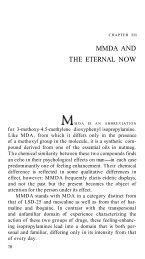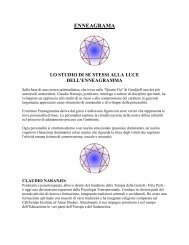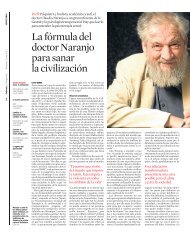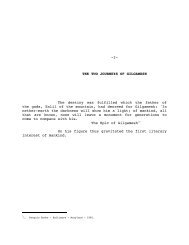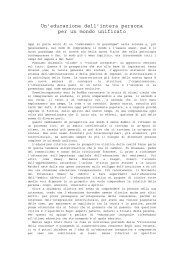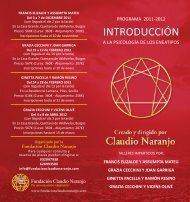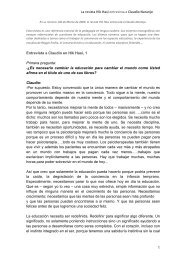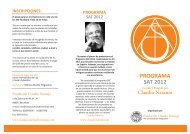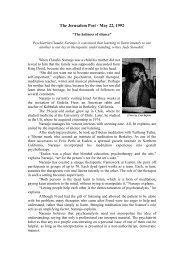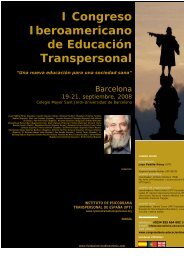Present – Centeredness in Gestalt Therapy Claudio Naranjo
Present – Centeredness in Gestalt Therapy Claudio Naranjo
Present – Centeredness in Gestalt Therapy Claudio Naranjo
You also want an ePaper? Increase the reach of your titles
YUMPU automatically turns print PDFs into web optimized ePapers that Google loves.
we may speak of ideals <strong>in</strong> Taoism, for <strong>in</strong>stance, <strong>in</strong> spite of its be<strong>in</strong>g a philosophy of nonseek<strong>in</strong>g. In<br />
spite of its non<strong>in</strong>junctional style, the Tao Te Ch<strong>in</strong>g is always elaborat<strong>in</strong>g on the qualities of the sage:<br />
"For this reason the sage is concerned with the belly and not the eyes The sage is free from the<br />
disease because he recognizes the disease to be disease. . . . The sage knows without go<strong>in</strong>g about . .<br />
. accomplishes without any action," and so on. In the same sense, present-centeredness is regarded<br />
as an ideal <strong>in</strong> statements such as: "Now is the watchword of the wise."<br />
Some recipes for better liv<strong>in</strong>g are means to an end that differ from such an end <strong>in</strong> quality, but this is<br />
not true of present-centeredness. Here, as <strong>in</strong> <strong>Gestalt</strong> therapy <strong>in</strong> general, the means to an end is a<br />
shift<strong>in</strong>g to the end state right away: the way to happ<strong>in</strong>ess is that of start<strong>in</strong>g to be happy right away;<br />
the way to wisdom that of rel<strong>in</strong>quish<strong>in</strong>g foolishness at this very moment - just as the way to swim is<br />
the practice of swimm<strong>in</strong>g. The prescription of liv<strong>in</strong>g <strong>in</strong> the now is the consequence of the fact that<br />
we are liv<strong>in</strong>g <strong>in</strong> the now; this is someth<strong>in</strong>g that the sane person knows, but the neurotic does not<br />
realize while enmeshed <strong>in</strong> a dreamlike pseudo-existence.<br />
In Buddhism the now is not merely a spiritual exercise but the condition of the wise. In a passage of<br />
the Pali Canon, Buddha first utters the prescription:<br />
and then the ideal:<br />
Do not hark back to th<strong>in</strong>gs that passed,<br />
And for the future cherish no fond hopes:<br />
The past was left beh<strong>in</strong>d by thee,<br />
The future state has not yet come.<br />
But who with vision clear can see<br />
The present which is here and now<br />
Such wise one should aspire to w<strong>in</strong><br />
What never can be lost nor shaken.<br />
Whereas the Buddhist version of the now <strong>in</strong>junction stresses the illusor<strong>in</strong>ess of the alternatives, the<br />
Christian view stresses the trust and surrender entailed by presentcenteredness. When Jesus says, "'<br />
Take, therefore, no thought of the morrow, for the morrow shall take thought of the th<strong>in</strong>gs of<br />
itself," giv<strong>in</strong>g the example of the lilies of the fields [Matt. 6], he is not only say<strong>in</strong>g, "Don't act upon<br />
catastrophic expectations," but more positively, "Trust!" While the Christian version is framed <strong>in</strong> a<br />
theistic map of the universe, and trust means trust <strong>in</strong> the heavenly Father, the attitude is the same<br />
as that regarded as the ideal <strong>in</strong> <strong>Gestalt</strong> therapy, which may be rendered as trust <strong>in</strong> one's own<br />
capacities for cop<strong>in</strong>g with the now as it comes. The ideal of present-centeredness is one of<br />
experienc<strong>in</strong>g rather than manipulat<strong>in</strong>g, of be<strong>in</strong>g open to and accept<strong>in</strong>g experience rather than<br />
dwell<strong>in</strong>g <strong>in</strong>, and be<strong>in</strong>g defensive <strong>in</strong> the face of, possibility. Such attitudes bespeak two basic<br />
assumptions <strong>in</strong> the Weltanschauung of <strong>Gestalt</strong> therapy: th<strong>in</strong>gs at this moment are the only way that<br />
they can be; and behold, the world is very good!<br />
If the present cannot be other than it is, the wise will surrender to it. Furthermore if the world is<br />
good, why not, as Seneca puts it, "gladly take the gifts of the present hour and leave vex<strong>in</strong>g<br />
thoughts." To say of anyth<strong>in</strong>g that it is good is, of course, a statement alien to <strong>Gestalt</strong> therapy,<br />
which holds that th<strong>in</strong>gs can only be good to us. Whether they are depends on us and what we do



